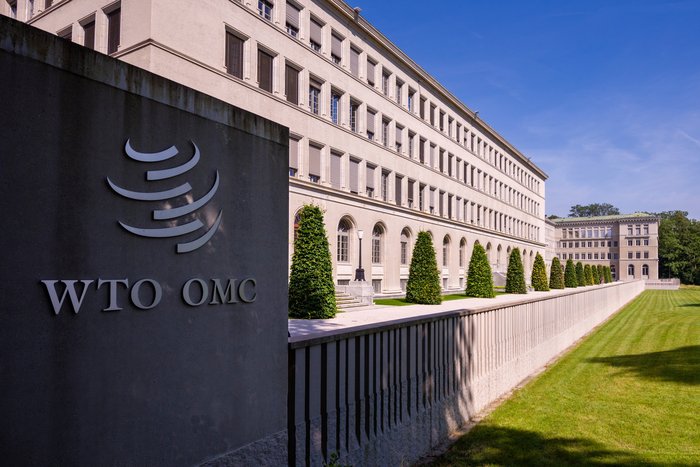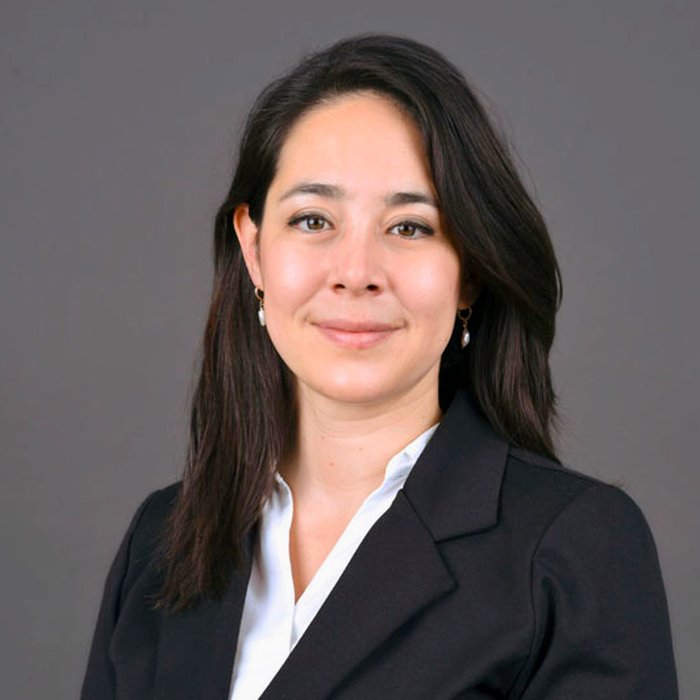Tailored for professionals and students with limited time, these courses offer an opportunity to gain expertise in specific fields of study. Designed for flexibility, they combine high-impact learning with convenience, making them ideal for career enhancement or academic enrichment.
Short courses

For government officials, embassy and NGO staff, and students
The Law and Policy of Artificial Intelligence Regulation
The rapid adoption and development of artificial intelligence (AI) brings both unprecedented opportunities and challenges for trade, economic development, labour markets, and social structures. Although significant benefits and efficiencies can be gained from AI adoption, its use may also result in or exacerbate existing challenges, including inequality, the digital divide, and environmental degradation. The irresponsible, illegal, and malicious use of AI may even compromise democratic processes, raise ethical concerns, and violate human rights.
This course is designed to explore AI policymaking and regulation. In doing so, we will examine the history of technological disruption; the nature, risks, and benefits of AI; and the emerging AI regulatory and policy landscape. Through comparative analysis and case studies, participants will engage with the current discourse on AI regulation and develop their own views on the emerging regulatory approaches. This course will equip participants with an understanding of the disruptions that AI (and other of frontier technologies) has brought and prepare them to contribute to policymaking in this dynamic field.
Dates: 19 March and 2 and 30 April from 11.00-13.30
Lecturers
Lecturers: Kholofelo Kugler and Johannes Fritz
Kholofelo Kugler
Kholofelo Kugler is Counsel at the Advisory Centre on WTO Law in Geneva, Switzerland. She is also a nonresident scholar with the Carnegie Endowment for International Peace’s Africa Program. Previously, she was a PhD Fellow in the project Trade Law 4.0 at the University of Lucerne, Switzerland, where she researched digital trade and AI regulation issues. Kholofelo regularly lectures trade law and digital trade law at academic and training institutions in Africa, the Caribbean, Europe, and the United States.
Johannes Fritz
Johannes Fritz is the CEO of the St. Gallen Endowment, a Swiss non-profit that champions international openness, collaboration and exchange. He leads the Digital Policy Alert transparency initiative focusing on prominent digital trade issues such as data transfers and AI regulation. Alongside his work for the St. Gallen Endowment, he is a Lecturer for Economic History and Economic Thought at the University of Fribourg, Switzerland. Johannes holds a Ph.D. in Economics, and his work focuses on utilizing technology to bring transparency to public policy choice.
Venue
World Trade Institute (WTI), Hallerstrasse 6, 3012 Bern
This course is hybrid: it is offered on-site and online (Zoom)
Admission
The course is open to government officials, embassy staff, people working for international organisations and NGOs, WTI alumni, and Master students from any faculty of the University of Bern or any other university worldwide.
If you are interested, please send an email to masters.wti@unibe.ch
Fees
CHF 800
Introduction to International Negotiation and Conflict Management
Enhance your negotiation skills with us!
Need to negotiate daily but lack the skills to do so successfully? If so, this short course could be the answer. Through practical exercises, case analysis and group discussion you will learn the strategies needed to solve conflicts of interest in a sustainable way.
About the course
This four-day course aims to form and enhance participants’ awareness of the negotiating process. They will acquire the tools and develop the skills required to manage everyday negotiation situations successfully.
The course is taught by Prof. Dr. Felix Addor, a veteran international negotiator with the Swiss government, and Deputy Director General of the Swiss Federal Institute of Intellectual Property (Swiss Ministry of Justice), the federal agency in charge of all intellectual property matters in Switzerland
Course dates
Fridays March 6, 13, 20 and 27, 2026
3 ECTS
Venue
World Trade Institute (WTI), Hallerstrasse 6, 3012 Bern
*Please note that this course is only offered on site*
Admission
Registration is now closed for this course.
The course is open to government officials, embassy staff, people working for international organisations and NGOs as well as students from different universities. If you are interested, please send an email to masters.wti@unibe.ch including your updated CV in PDF.
Fees
CHF 1600
Digital Trade Law
What's peculiar about digital trade? And how is it regulated at multilateral and bilateral levels?
Learn about the contemporary landscape of global digital trade rulemaking.
About the course
The course explores the dynamic field of digital trade governance. It offers a deep understanding of the topic of digital trade, as well as of the emergent regulatory framework that governs it. This includes the rules of the World Trade Organization (WTO) and the detailed framework of rules developed in preferential trade agreements (PTAs). The course covers in this latter sense major agreements, such as the CPTPP, the USMCA and the EU-UK Trade and Cooperation Agreement and gives a clear sense of the positioning of the key stakeholders within the preferential trade landscape and under the WTO plurilateral negotiations under the Joint Initiative on E-Commerce.
The course also explores the new generation of Digital Economy Agreements (DEAs) as legal innovation in the domain of digital trade regulation and as a new model of international cooperation in a technologically fluid environment. While the focus of the course is on global trade law, it also explores the important interfaces with domestic data governance regimes and the contestations around digital trade and privacy; digital trade and human rights; digital trade and sustainability, as well as data inequalities and the development dimension of global digital trade rulemaking.
Find the full syllabus here and below.
Lecturer
Mira Burri is Professor of International Economic and Internet Law at the Faculty of Law of the University of Lucerne, Switzerland. She teaches international intellectual property, media, internet and trade law. Mira’s current research interests are in the areas of digital trade, culture, copyright, data protection and data governance. Mira is the principal investigator of the project ‘Trade Law 4.0’ (ERC Consolidator Grant 2021– 2026; https://digitaltradelaw.ch/). She consults the European Parliament, UNESCO, ASEAN, the WEF and others on issues of digital trade and data-driven innovation. Mira is also a member of the Research Council of the Swiss National Science Foundation. Mira has edited the publications Trade Governance in the Digital Age (Cambridge University Press 2012) and Big Data and Global Trade Law (Cambridge University Press 2021).
Course dates
17 April 2025, 1 May 2025 (2 sessions) and 8 May 2025
9.00–11.30 (CET) – except on 1 May
2 ECTS
Venue
World Trade Institute (WTI), Hallerstrasse 6, 3012 Bern
This course is hybrid: it is offered on-site and online (Zoom)
Admission
The course is open to government officials, embassy staff, people working for international organisations and NGOs, WTI alumni, and Master students from any faculty of the University of Bern or any other university worldwide.
If you are interested, please send an email to masters.wti@unibe.ch
Fees
CHF 800
Intellectual Property law and Human Rights
The course addresses the conceptual differences and interaction of intellectual property and human rights. It discusses the interrelation of the two disciplines in the field of the right to health, access to medicines and biotechnology, in the context of climate change mitigation and adaption and in the digital economy. The three lectures focus on international law, in particular the TRIPs Agreement of the WTO, human rights instruments, sustainable Development Goals (SDGs) and the emerging duty to act under the principle of Common Concern of Humankind.
Intellectual property and human rights protection often are seen in tension, if not contradiction. On the one hand is the allocation of exclusive property rights in knowledge and information. On the other hand is the right of all humankind to participate in, and benefit from, scientific and technological progress made. The tensions have been mainly discussed in relation to the right to health and more recently, as a problem of access to medicines and vaccines. Other areas of tension include the digital economy and the management of social media, as well as access to sustainable technology in the context of climate change. The relationship is a complex one, as intellectual property is an important foundation of knowledge and information, while human rights protect a wide range of normative claims based upon the protection of human dignity, entailing both civil and political, as well as economic and social rights.
Lecturer Thomas Cottier
Dr Thomas Cottier, former Managing Director of the World Trade Institute, is Professor Emeritus of European and International Economic Law at the University of Bern. He published widely in the field of international economic law, with a particular focus on constitutional theory and intellectual property. He directed the national research programme on trade law and policy (NCCR International Trade Regulation: From Fragmentation to Coherence) located at the WTI from 2006-2014. He is an associate editor of several journals. He was a visiting professor at the Graduate Institute, Geneva, the Paris I Sorbonne, University of Barcelona, and regularly teaches at the Europa Institute Saarbrücken, Germany, at Wuhan University, China, at the University of Torino and more recently at the University of Ottawa, Canada. He was a member of the Swiss National Research Council from 1997-2004 and served on the board of the International Plant Genetic Resources Institute (IPGRI) Rome during the same period. He served the Baker & McKenzie law firm as Of Counsel from 1998 to 2005. He held several positions in the Swiss External Economic Affairs Department and was the Deputy-Director General of the Swiss Intellectual Property Office. Prof. Cottier has a long-standing involvement in GATT / WTO activities. He served on the Swiss negotiating team of the Uruguay Round from 1986 to 1993, first as Chief negotiator on dispute settlement and subsidies for Switzerland and subsequently as Chief negotiator on TRIPs. He has served as a member or chair of several GATT and WTO panels and currently serves on the rooster of 10 appeal arbitration panelists of the MPIA.
Course dates
6, 13 and 20 March, 2025
2 ECTS
Venue
World Trade Institute (WTI), Hallerstrasse 6, 3012 Bern
This course is hybrid: it is offered on-site and online (Zoom)
Admission
The course is open to government officials, embassy staff, people working for international organisations and NGOs, WTI alumni, and Master students from any faculty of the University of Bern or any other university worldwide. Persons interested in the legal and policy interface of intellectual property and human rights protection, particularly in the fields of health, nutrition and the cyber economy might also be particularly interested in this course.
If you are interested, please send an email to masters.wti@unibe.ch
Fees
CHF 800
PAST COURSE - Trade Policy Making and the WTO
Catch up on global economic governance, the WTO, its past and future, with the very best in the field!
About the course
This course will look into the issue of global economic governance and the role of the WTO in the current international context. It will cover a brief background on the founding principles and functions of the WTO and check whether these are still valid and operational today.
The course will then explore the issue of WTO Reform, based on the problems and proposals identified by Members. This includes issues of transparency, negotiations and dispute settlement. The course will also look into the evolution of WTO Ministerial Conferences.
Lecturer
Victor do Prado is a professor of Economic Diplomacy at the Paris School of International Affairs - SciencesPo and Senior Fellow at the Brazilian Center for International Relations. From 2012 to 2022, he was the Director of the Council and Trade Negotiations Committee Division at the WTO. He was a diplomat and member of the Brazilian delegation and negotiating team during the concluding phase of the Uruguay Round and early years of the WTO. Victor do Prado served as a panelist in three WTO dispute settlement cases. From 2005 to 2012, he was WTO’s Deputy Chief of Staff.
Course dates
April 29 and 30, 2024
1 ECTS
Venue
World Trade Institute (WTI), Hallerstrasse 6, 3012 Bern
This course is hybrid: it is offered on-site and online (Zoom).
Admission
The course is open to government officials, embassy staff, people working for international organisations and NGOs, WTI alumni as well as students from different universities. If you are interested, please send an email to masters@wti.org including your updated CV in PDF.
Fees
480 Swiss francs
PAST COURSE - Government Procurement Regulation in the WTO
Can international procurement law be reconciled with government principles and other policy objectives, like environmental and social sustainability?
Learn about government procurement law and how it's regulated at the multilateral, WTO level.
About the course
This course provides an introduction to the international law governing government procurement (also referred to as “public procurement”). Students will gain an in-depth understanding of what government procurement is and how it is regulated within the World Trade Organisation (WTO) through the Government Procurement Agreement (GPA).
The course will focus on contemporary issues that surround international government procurement, e.g. the strategic use of government procurement to advance sustainability goals. Finally, students will familiarize themselves with current developments in government procurement within the WTO, on a national level and through Free Trade Agreements (FTA).
Find the full syllabus here and below.
Lecturer
Dr. Rika Koch is an assistant professor and co-leader of the public procurement research group at the Bernese University of Applied Science (BFH). In addition, she is a lecturer in WTO Law and a guest lecturer on Swiss foreign economic law at the Universities of Zurich and Bern. Before her current role, she served as a legal counsel in the Swiss Federal Administration, where she advised on a number of legal issues, especially public procurement projects.
She studied political science at the University of Zurich, Law at the University of Bern and did her PhD in green government procurement at the University of Zurich with a research stay at the University of Nottingham (UK), funded by the Swiss National Foundation SNF.
In her research, she focuses on public procurement law at the intersection of environmental and social law, but also on questions surrounding public procurement law and digitalization, such as data protection and artificial intelligence (AI).
Course dates
Four Thursdays in October and November (19.10, 2.11, 16.11, 30.11), 9.15 – 11.45 hrs
2 ECTS
Venue
World Trade Institute (WTI), Hallerstrasse 6, 3012 Bern
This course is hybrid: it is offered on-site and online (Zoom).
Admission
The course is open to government officials, embassy staff, people working for international organisations and NGOs, WTI alumni Master students from the University of Bern or any other university worldwide.
If you are interested, please send an email to masters@wti.org
Fees
600 Swiss francs









